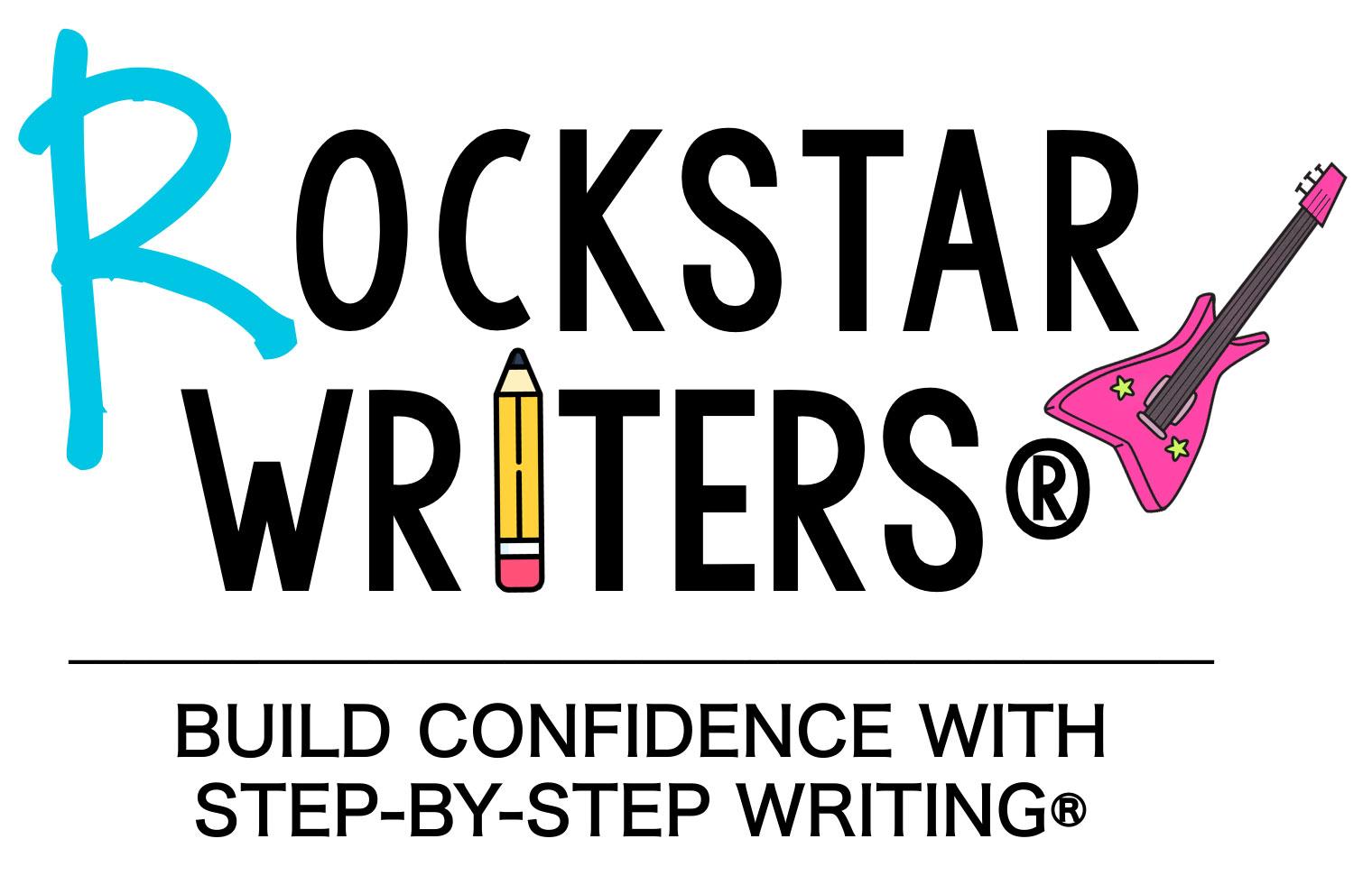IS ROCKSTAR WRITERS® RESEARCH-BASED?
Yes! It provides HIGH-QUALITY and RESEARCH-BASED writing instruction.
Motivate

The Rockstar Writers® method includes creative mini-lessons for student-centered learning. It provides engaging opportunities for student choice to explore interests, voice to increase ownership, and peer reflections to improve writing. Students become empowered as they build confidence and trust in their writing, and they get excited about the next writing lesson.
Educate

The Rockstar Writers® method uses a systematic approach that incorporates explicit teaching and scaffolding into each standard-based unit. Explicit teaching provides students with a solid foundation and an exemplar of the lesson being presented. Scaffolded lessons easily guide students step-by-step through the writing process by building upon each lesson until they have an effective final copy.
Differentiate

The Rockstar Writers® method implements differentiated instruction, so all students can feel supported and learn to write effectively. There are a variety of ways to help students, regardless of their academic level. It offers materials, lessons, and training needed for differentiated instruction, including progress monitoring, leveled note-taking, and the use of prior knowledge and interests.
RESEARCH-BASED STRATEGIES
Student-Centered
Research shows that students are more motivated to learn about something when they are offered choice. (Theesfeldm, 2021)
Student-centered learning keeps students “at the center” by offering voice, choice, competency-based progression, and continuous monitoring of student needs. (Harrington, C. & DeBruler, K., (2019)
ROCKSTAR WRITERS®
•
Student Choice
•
Peer Reflections
•
Student Tracking
•
Writing Goals
•
Opinion Writing
•
Progress Monitoring
Theesfeld, Sarah, “Effects of Student Choice on Student Motivation and Engagement within an Elementary Classroom” (2021).
Dissertations, Theses, and Projects. 500. https://red.mnstate.edu/thesis/500
Harrington, C. & DeBruler, K. (2019, October 22). What Exactly IS Student-Centered Learning? [Blog post].
Explicit-Instruction
Explicit instruction in writing strategies and practice help students become proficient writers. (Graham et al., 2018)
“Learning is enhanced only when the information presented is explicit, logically organized, and clearly sequenced. To do anything less shirks the responsibility of effective instruction.” (Stockard, Wood, Coughlin, & Rasplica Khoury, 2018)
ROCKSTAR WRITERS®
•
Strategy-Focused Direct Instruction
•
Teacher Modeling and Mentor Text
•
83 Student Mini-Lesson Videos
•
Task Cards and Other Practice
Graham S., Harris K. R. (2018). An examination of the design principles underlying a self-regulated strategy development study based on the writers in community model. Journal of Writing Research, 10, 139–187.
Stockard, J., Wood, T. W., Coughlin, C., & Rasplica Khoury, C. (2018). The effectiveness of direct instruction curricula: A meta-analysis of a
half century of research. Review of Educational Research, 88(4), 479-507.
Differentiated Instruction
Differentiated instruction supports all students regardless of academic levels. It allows them to explore their interests in a way that works for them. (Lawrence-Brown, 2004).
Differentiated instruction is adjusting one or more of the following: the content, the process, or the product. (Tomlinson and Strickland, 2005)
ROCKSTAR WRITERS®
•
Different Levels of Note Taking
•
Using Prior Knowledge and Interest
•
Training on Differentiated Instruction
•
Lessons for Differentiation
•
Progress Monitoring
Lawrence-Brown, D. (2004). Differentiated instruction: Inclusive strategies for standards based learning that benefit the whole class. American Secondary Education, 32(3), 34-62.
Tomlinson, C. A., & Strickland, C. A. (2005). Differentiation in practice: A resource guide for differentiating curriculum, grades 9–12. Alexandria, VA: ASCD.
SCAFFOLDING
Younger writers and those who struggle with writing will require … enhanced scaffolding (e.g., repetitive modeling, graphic aids, checklists, etc.). (Troia, G. 2014)
Teachers should help students set goals and monitor progress. (Bruning and Horn, 2000)
ROCKSTAR WRITERS®
•
Scaffolded Lessons
•
Goal Setting
•
Progress Monitoring
•
Anchor Charts
•
Graphic Organizers
•
Checklists & Rubrics
•
Mnemonic Devices (C.U.P.S.)
•
Task Cards and Skill Practice
Troia, G. (2014). Evidence-based practices for writing instruction (Document No. IC-5). Retrieved from University of Florida, Collaboration for Effective Educator, Development, Accountability, and Reform
Center website:
http://ceedar.education.ufl.edu/tools/innovation-configuration/
Bruning, R., & Horn, C. (2000). Developing Motivation to Write. Educational Psychologist, 35, 25-37.
https://doi.org/10.1207/S15326985EP3501_4
The Writing Process
Writing instruction should focus on helping students understand and execute … elements of the writing process, including prewriting activities to generate ideas and plan content for papers, drafting the text, and revising and editing text (Graham, McKeown, Kiuhara, & Harris, 2012; Graham & Perin, 2007a; Graham & Sandmel, 2011).
ROCKSTAR WRITERS®
•
Writing Prompts
•
Prewriting and Drafting
•
Writing Process Interactive Notes
•
Editing Strategies
•
Portfolio Development
Graham, S., McKeown, D., Kiuhara, S., & Harris, K. R. (2012). A meta-analysis of writing instruction for students in the elementary grades. Journal of Educational Psychology, 104, 879-896. doi:10.1037/a0029185
Graham, S., & Perin, D. (2007a). A meta-analysis of writing instruction for adolescent students. Journal of Educational Psychology, 99, 445-476. doi:10.1037/00220663.99.3.445
Graham, S., & Sandmel, K. (2011). The process approach: A meta-analysis. The Journal of Educational Research, 104, 396-407. doi:10.1080/00220671.2010.488703
Professional Development
Teachers devote more time and attention to teaching writing if they are better prepared to teach it…(e.g., De Smedt et al., 2016; Rietdijk et al., 2018; Troia & Graham, 2016).
ROCKSTAR WRITERS®
•
6 Module Teacher Virtual PD
•
Possible to Earn PD Credit
•
Portfolio Development
•
Facebook Writing Community
•
Interactive Digital Versions
De Smedt F., van Keer H., Merchie E. (2016). Student, teacher, and class-level correlates of Flemish late elementary school children’s writing performance. Reading & Writing: An Interdisciplinary Journal, 29, 833–868.
Rietdijk S., van Weijen D., Jassen T, van den Bergh H., Rijlaarsdam G. (2018). Teaching writing in primary education: Classroom practice, time, teachers’ beliefs and skills. Journal of Educational Psychology, 110, 640–663.
Troia, G. A., & Graham, S. (2003). Effective writing instruction across the grades: What every educational consultant should know. Journal of Educational and Psychological Consultation, 14, 75-89. doi:10.1207/S1532768XJEPC1401_04
Systematic Approach
Students need to receive high-quality writing instruction…with a systematic approach. (Graham, 2019)
ROCKSTAR WRITERS®
•
Step-by-Step Digital and Print Programs
•
Scripted Lesson Plans
•
Pacing Guide
•
Organizational Tips for Set Up
•
Hits Curriculum Standards
Graham, S. (2019). Changing How Writing Is Taught. Review of Research in Education, 43(1), 277–303. https://doi.org/10.3102/0091732X18821125
Note Taking
Research indicates that note taking improves comprehension of material read (Denner, 1987; Hattie, Biggs, & Purdie, 1996).
“The use of interactive notebooks is supported by research on the brain, multiple intelligence, and note taking.” (Wist, 2006)
ROCKSTAR WRITERS®
•
Interactive Notebook
•
Student Resource Guides
•
Google Doc Accessibility
Denner, P. R. (1987). Comparison of the effects of episodic organizers and traditional note taking on story recall. Retrieved from ERIC database. (ED270731)
Hattie, J., Biggs, J., & Purdie, N. (1996). Effects of Learning Skills Interventions on Student Learning: A Meta-Analysis. Review of Educational Research, 66(2), 99-136. https://doi.org/10.3102/00346543066002099
Wist, C. (2006). Putting it all together: Understanding the research behind interactive notebooks. School of Education, Curriculum and Instruction Elementary. Available at https://tccl.arcc.albany.edu/knilt/images/d/d0/Interactive_Notebooks_Research.pdf
Basic Foundational Skills
Curricular objectives should address basic foundational skills such as sentence construction, knowledge of different text types, vocabulary, and characteristics of good writing (Graham, et al., 2018)
ROCKSTAR WRITERS®
•
Sentence Structure & Paragraph Writing Modules
•
C.U.P.S.
•
Story Elements
•
Genre Analysis
•
Vocabulary Building
•
Use of Mentor Texts
Graham S., Harris K. R. (2018). An examination of the design principles underlying a self-regulated strategy development study based on the writers in community model. Journal of Writing Research, 10, 139–187.
Word Choice
Creativity in writing is heightened when students understand how to convey sensory details with vivid, descriptive language (Jampole, Konopak, Readence, & Moser, 1991).
ROCKSTAR WRITERS®
•
Figurative Language Practice
•
Trash Can Words and Million Dollar Words
•
Practice
•
Use of Mentor Texts
•
Vocabulary Development
Jampole, E. S., Konopak, B. C., Readence, J. E., & Moser, E. B. (1991). Using mental imagery to enhance gifted elementary students’ creative writing. Reading Psychology: An International Quarterly, 12, 183 -197. doi:10.1080/0270271910120301
Timely Feedback
Students acquire knowledge and beliefs about how to write through mentoring, feedback, collaboration, and instruction. This can be provided by a teacher, another adult such as a parent or peer… (Graham, Harris, & Santangelo, 2015; Graham, Hebert, & Harris, 2015).
ROCKSTAR WRITERS®
•
Consistent and Timely Feedback Model
•
Peer-to-Peer Reflection
•
Teacher Conferencing
•
Student Writing Centers
Graham S., Harris K. R., Santangelo T. (2015). Research-based writing practices and the Common Core: Meta-analysis and meta-synthesis. Elementary School Journal, 115, 498–522.
Graham, Steve & Hebert, Michael & Harris, Karen. (2015). Formative Assessment and Writing: A Meta-Analysis. The Elementary School Journal. 115. 000-000. 10.1086/681947.
TASK REPETITION
“The deepest “aha’s” spring from an encounter and then a return. Repeating the encounter fuses it into one’s awareness. One of the biggest mistakes a teacher can make is to forego the return or repetition.” (Bruner, 2001)
“Based on these cases, we contend that repeated encounters with tasks over extended periods create a valuable pedagogic environment, and within this context students’ agentic attitudes towards the L2 writing task are likely to influence their learning in significant ways.” (Nitta & Baba, 2018)
ROCKSTAR WRITERS®
•
Repetition of the Writing Process
•
Repetition of Skills in Essay Writing
•
Repetition of Skills Across Grade Levels
Bruner, Robert. (2001). Repetition is the First Principle of All Learning.
Nitta, Ryo & Baba, Kyoko. (2018). Understanding benefits of repetition from a complex dynamic systems perspective: The case of a writing task. 10.1075/tblt.11.11nit.
Why Writing Instruction Matters
Writing is a fundamental skill (Graham et al., 2019) that writers use to learn new ideas, persuade others, record information, create imaginary worlds, express feelings, entertain others…chronicle experiences, and explore the meaning of events and situations. (Graham, 2018a)
Effective writing instruction:
- increases students’ future success (Graham, 2019)
- provides students with a tool for visibly and permanently recording, connecting, analyzing, personalizing, and manipulating key ideas in the text (Graham & Hebert, 2011)
- allows for daily social interaction, self-exploration, and expression (NCWAFSC, 2008)
- enhances students’ performance in other important school subjects, and, (Graham, 2019)
- connects writing to language and reading. (Shanahan, 2006)
Further, writing growth is a consequence of writing and deliberate practice. (Bazerman et al., 2017; Graham, Harris, & Chambers, 2016; Kellogg & Whiteford, 2009).
Bazerman C., Applebee A. N., Berninger V. W., Brandt D., Graham S., Matsuda P. K., . . . Schleppegrell M. (2017). Taking the long view on writing development. Research in the Teaching of English, 51, 351–360.
Graham S. (2018a). A revised writer(s)-within-community model of writing. Educational Psychologist, 53, 258–279.
Graham, S. (2019). Changing How Writing Is Taught. Review of Research in Education, 43(1), 277–303. https://doi.org/10.3102/0091732X18821125
Graham S., Harris K. R., Chambers A. (2016). Evidence-based practice and writing instruction. In MacArthur C., Graham S., Fitzgerald J. (Eds.), Handbook of writing research (Vol. 2, pp. 211–226). New York, NY: Guilford Press.
Graham S., Hebert M. (2011). Writing-to-read: A meta-analysis of the impact of writing and writing instruction on reading. Harvard Educational Review, 81, 710–744.
Kellogg R., Whiteford A. (2009). Training advanced writing skills: The case for deliberate practice. Educational Psychologist, 44, 250–266.
National Commission on Writing for America’s Families, Schools, and Colleges. (2003, April). The neglected R: The need for a writing revolution. New York, NY: College Entrance Examination Board. Retrieved from http://www.writingcommission.org/prod_downloads/writingcom/neglectedr.pdf
Shanahan T. (2006). Relations among oral language, reading, and writing development. In MacArthur C. A., Graham S., Fitzgerald J. (Eds.), Handbook of writing research (pp. 171–183). New York, NY: Guilford Press.
